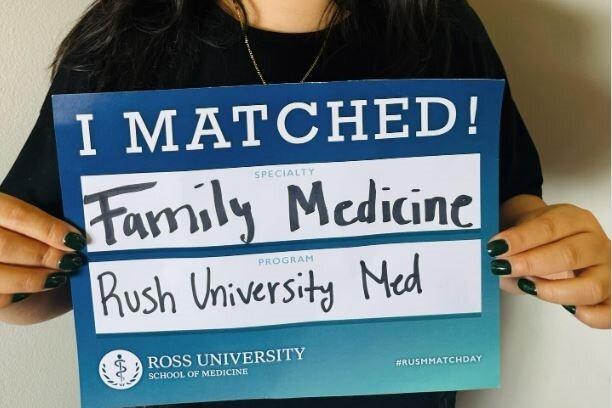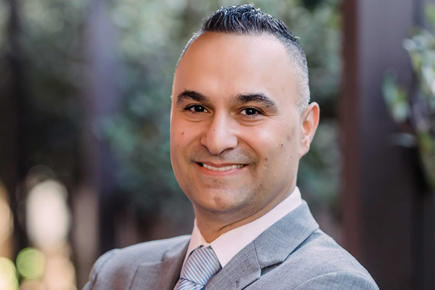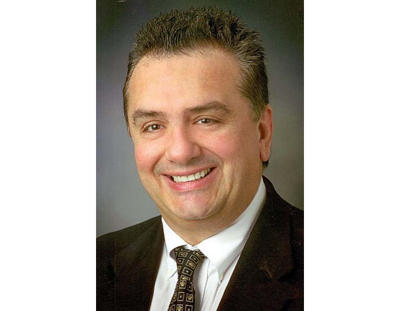As a child in Sierra Leone, Dr. Brian Temple’s interest in science was fostered by his inquisitive spirit. He was often intrigued by the inner working of his toys and would take them apart, trying to figure out their functioning mechanism. He would also build model homes and would wire them to have battery controlled electricity. He thought his initial path in life would lead him into a career in engineering, but he changed his course during his anatomy class in high school. He realized that he was continually fascinated and curious by the functionality of the human anatomy.
After graduating from high school early at 16 years old, Brian was awarded a scholarship to attend Farleigh Dickinson University in New Jersey, where he graduated with honors with a B.S. and M.S. in Biology, minor in Chemistry with a concentration in Biotechnology. Initially, he wanted to pursue a PhD and work on sickle cell disease research, but realized he did not want to be sequestered in a lab all day and preferred the personal interaction that physicians have with their patients. As he was weighing his options late in his senior year between a PhD and possibly medical school, Brian attended a Ross University School of Medicine (RUSM) seminar in his biology class that piqued his interested. Inspired by the physicians in his family who loved the work they were doing in the community and the admiration from their patients, he realized it was a profession that garnered respect, requiring the best of your abilities and that was the path he wanted to follow. Temple soon took his MCATs, but did not perform as well as he had hoped, he also applied to Ross University School of Medicine and was accepted. After further research and not wanting to further delay the next chapter in his career, Dr. Temple decided RUSM was the best choice for him.
Dr. Temple remembers his first few semesters at RUSM on Dominica as incredible, as he made lifelong friends that he is still in touch with today. He recalls enjoying the fresh fruits the island had to offer and the ‘Mud Bowl’ soccer and football matches with fellow students. He also remembers leaving the anatomy lab during his second semester and going straight to lunch, reeking of formaldehyde. He also describes his experience at RUSM as challenging, but believes RUSM graduates have a resiliency that allows for perseverance in nearly all situations. A characteristic that he would not trade anything for.
Upon graduation from RUSM in 2005, Dr. Temple completed his Residency at Muhlenberg Regional Medical Center, specializing in Internal Medicine (IM). Brian chose IM as he believes,
it’s the epitome of medicine, it requires the physician to assess the entirety of the patient, mind and body, and challenges your medical knowledge and application daily.
Following the completion of his Residency, Dr. Temple pursued a Fellowship at University of Mississippi Medical Center in Infectious Disease (ID) to learn about HIV and HIV care. At the time, UMMC had the largest HIV clinic in the US and Brian recalls the training and exposure as superb. Under Dr. Leandro Mena’s mentorship, he was exposed to extreme pathology in AIDs patients, i.e. his first case of Kaposi Sarcoma, cancer that develops from the cells that line lymph or blood vessels and Cryptococcal meningitis, a serious infection of the brain and spinal column. During his 2nd year of ID Fellowship, Dr. Temple had the opportunity to work with Dr. Risa Webb at the Mississippi Health Department with Mike Holcomb – they were imperative in developing Brian’s passion for Tuberculosis (TB) and work in helping TB/HIV infected individuals.
Following a brief tenure as an affiliate Assistant Professor of Medicine at UMMC, Dr. Temple continued onto a Fellowship at Brown University. Here, under the guidance of Drs. Kwara and Flanigan, Dr. Temple began to excel in research, working with researchers from around the world, specifically during the B.I.A.R.I (Brown International Advanced Research Institute). He quickly learned how to ask the right questions and discover different ways in retrieving the answers. Highlights during his Fellowship at Brown University include the following:
- Initiation of a research program at Connought Hospital in Freetown, Sierra Leone, through the T-32 research grant with Dr. Conteh and Wellbody Alliance; providing care for HIV infected patients in the country’s largest clinic. Also, he worked on developing infection control measures for the country.
- With the assistance of Brown University and Texas Tech University Health Sciences Center, Dr. Temple was able to import the very first GeneXpert machine into Sierra Leone in the diagnosis of TB in HIV infected patients. Effectively, the GeneXpert detects TB DNA at a molecular level using a sputum sample and it also can detect the genetic mutations associated with resistance to Rifampicin, medication to treat TB.
- Worked with the Mississippi Health Department to understand the molecular epidemiology of TB, that was causing a major outbreak in the greater Jackson metro area.
- Helped in improving access to medical care and addressing HIV stigma in southern states in the U.S., through community outreach and education.
After completion of his Fellowship at Brown, Dr. Temple accepted an academic appointment at Texas Tech University Health Sciences Center, the same institution that assisted in bringing in the first GeneXpert machine into Sierra Leone.
With the 30th Anniversary of World’s AIDs Day on December 1st, Dr. Temple expresses how his recent attendance to two conferences, the International AIDs conference and Infectious Disease week, revitalized him; after attending both conferences, he felt a strong sense of accomplishment in how far the medical community has come in regards to HIV/AIDS. Infected patients can now be treated with a single pill and their life expectancy is similar to the uninfected population. New vaccines and drug development continue to keep the medical community hopeful in the battle against HIV/AIDS.
He’s also proud in the progress in alleviating the stigma attached to an infected diagnosis, now an undetectable viral load means un-transmittable (U=U). He recalls telling this to one of his patients and she cried tears of relief. There has also been great success with pre-exposure prophylaxis (Pre-p), antiviral medication for the prevention of HIV/AIDS.
For as far as we have come, the journey continues – despite the medical community’s commitment to eradicating the AIDs epidemic by 2030. The greatest risk for HIV is now seen in African American women in the southern United States. Also, the International Aids Society has released several statements of concern regarding Tanzania’s anti-gay incentives, including arresting individuals and closing HIV clinics, limiting their access to medical education and proper clinical care.
For the last few years, Dr. Temple has worked in large hospital systems in Wisconsin as an Infectious Disease physician, he continues to work with students and enjoys treating patients in smaller communities, where the impact is more palpable. In the future, Dr. Temple hopes to rejuvenate his international clinical and research medical projects and to continue to have an impact in his local community. He would also like the opportunity to have a role in shaping the minds and mentoring the next generation of physicians.



